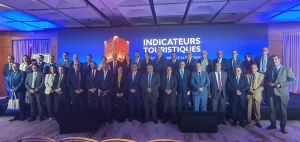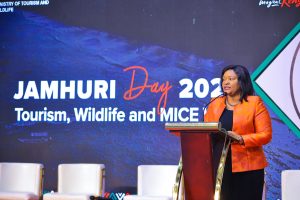The important role of the domestic tourism market for tourism development in West Africa was emphasized at the maiden edition of the hybrid West Africa Tourism Roundtable Series.
While physical participants gathered at Radisson Blu in Lagos, virtual participants joined the discussion from different countries across the world including the United States, Tanzania and Ghana. According to the host and Senior Advisor at Red Clay Advisory, Dr. Adun Okupe, the Tourism Roundtable Series was conceived because “while we examine tourism development as an opportunity, it is important that we begin to know ourselves in West Africa because our challenges are peculiar and similar.
For example, the West Africa tourism gap will reduce if people spend holidays in the region”. The Roundtable Series is a platform for knowledge sharing, networking, and more importantly deliberations on problem-solving to address the most critical challenges the industry faces, which will have a catalytic impact on the development of the tourism industry in West Africa.
Speaking on the impact of COVID-19 on the hospitality industry and new paths to consider, Executive Director of Uraga Real Estate Limited and guest speaker at the event, Moyo Ogunseinde, said “it is important that leisure and hospitality providers ensure that we create packages and experiences to capture the long-term interest of the local tourism market”.
She shared insights on the experience of hotel operators in Nigeria during COVID-19, adding that hotel operators had to re-strategize and focus on the domestic leisure tourism market, whereas hitherto, the focus had been on the business and international tourism market. Ogunseinde, therefore, encouraged the participants of the roundtable discussions to address some of the challenges of creating a local tourism market across the country.
The maiden edition of the series was themed Domestic Tourism and COVID-19 – trends, and paths to sustainable hospitality, travel, and tourism businesses in West Africa. Senior expert on communications in Africa at the United Nations World Trade Organisation (UNWTO) and guest speaker at the event, Kojo Bentum-Williams, noted that “if we are ready to promote tourism in West Africa, we will need laws, mechanisms, infrastructure, and financing opportunities for businesses within the sector.”
The road ahead is indeed long and there is much to be done, connecting investors, updating the legal framework, and building the hard and soft infrastructure required for tourism development in West Africa. Teju Abisoye, Executive Secretary of the Lagos State Employment Trust Fund (LSETF) shared that it was important to create stronger linkages between the public and private sector, through active engagement.
The potential of the tourism industry in West Africa needs to be harnessed, in a tangible way to make strong contributions to sustainable development. One of the key reasons for the slow growth of tourism in West Africa is the lack of prioritization of the sector by the government. Yet, the government is faced with competing demands, requiring the tourism sector to develop its own voice and use this strongly to ensure tourism is given the priority it deserves and can make contributions to sustainable development.
The hybrid online and physical event was well-attended by investors, real estate developers, travel operators, architects, designers, and tourism consultants across West Africa. Information was also traded to drive manageability and sustainability in the tourism industry during the session.
Key insights from the roundtable sessions
The 4 breakout sessions brought about strategies, ideas, and actionable plans for the development of tourism in West Africa. Each roundtable was assigned to discuss identified topics relating to the theme of the event of unpacking the West Africa tourism economy.
Is there really an economy; the proposed areas for focus for domestic and regional tourism in West Africa, the extent to which COVID-19 has created opportunities for domestic and regional tourism and the proposed areas of focus for this and finally, how to ensure a stronger tourism network for tourists and service providers is created across West Africa.
1. It is important to professionalise the sector and change its perception from a casual employer of entry-level staff to a serious employer of labor. The industry requires mid and senior-level tourism experts across a range of professions including tourism law, tourism infrastructure, tourism financing, hospitality-concept creators, brand managers, public relations experts, and the like. How can we attract the best minds to the industry? And how do we expand the range of activities of agents already within the tourism industry?
2. Together with this, it is important for the agents across West Africa to identify and share best practices, what works, what doesn’t work well? How do we ensure the tourism industry is a learning one and how do we have a circular economy within the industry that focuses on learning and evolution?
3. This circular tourism economy approach requires active engagement with the public sector to ensure that policies are made that benefit the sustainable development of the sector. We need to identify the public officials at the various levels who have travel, hospitality, and tourism as part of their portfolios. This can be expanded to include the creative sector which feeds into the tourism industry.
4. To effectively engage as a sector, data is imperative as a tool to demonstrate the contributions of the tourism industry to the economy, and to socio-cultural and environmental development. How do we quantify these contributions? What metrics are we going to use? It is important that these metrics are harmonised and standardized across the region to take advantage of existing regional agreements and institutions in West Africa. Data is also important for decision-making and operational efficiencies.
5. This data-driven approach can then be used to make the case for and develop destinations in West Africa, many of which remain in their natural, undeveloped states. To become attractive tourist destinations, concerted efforts need to be taken to elevate the natural attractions into tourism destinations with activities to engage in, and a programme/schedule of events to ensure that visitors have a range of activities to engage in when they visit.
There were two tangible outcomes from the first edition:
• Several attendees within the industry have shown their desire to engage in tourism business strategy sessions for MSMEs across West Africa. If you would like to be part of this as a beneficiary or session leader, please contact us.
• A tourism policy engagement group led by Red Clay Advisory was also established at the event, following recommendations by participants. Its purpose is to have representatives from the tourism, hospitality, and creative sector who stand as a bridge between the industry and government. Interested individuals can contact Tobi Kola-Sodpio at solutions@redclayadvisory.com.
The West Africa Tourism Roundtable Series is hosted by Red Clay Advisory, a tourism advisory practice, focused on harnessing the transformative potential of sustainable tourism in West Africa. The roundtable sessions are intended to become a strong contributor to, and connector of the tourism value chain in West Africa.
The second edition of the roundtable series is scheduled for Wednesday, 5 May 2021 with the theme, AfCFTA, and Tourism: Practical guide for tourism and hospitality entrepreneurs. To register, please visit http://bit.ly/WATRoundtable2. For more information about our work at Red Clay Advisory, please visit our website: www.redclayadvisory.com or follow us on social media @redclayadvisory







